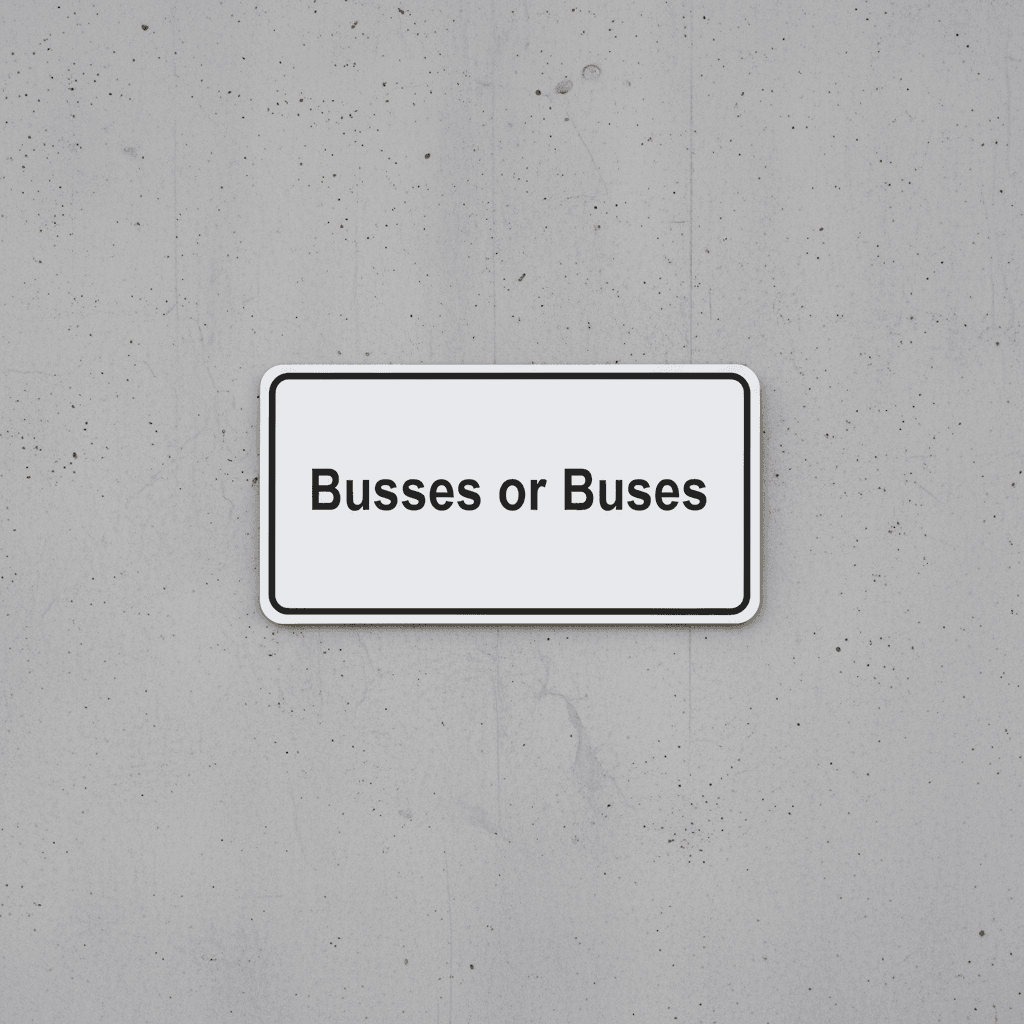Busses vs. Buses: What’s the Difference?
 The words busses and buses both come from the noun bus, but they have different meanings and uses.
The words busses and buses both come from the noun bus, but they have different meanings and uses.
One is the standard plural form, while the other is a different word with its own meaning.
Here’s the quick rule:
- Buses → correct plural of “bus” 🚌
- Busses → rare verb form meaning “kisses” 💋
1. Buses: The Correct Plural of “Bus”
Meaning
“Buses” is the standard and accepted plural form of bus, meaning a large vehicle that carries passengers.
This form is used in all modern English varieties, including both American and British English.
Examples (10 total)
- Three buses arrived late this morning.
- School buses are parked behind the building.
- The city added new electric buses to its fleet.
- Tourists boarded two buses for the trip.
- All buses stop here after 9 p.m.
- The company operates more than 100 buses.
- The buses were delayed due to heavy rain.
- Shuttle buses run every 15 minutes.
- These buses are designed for long-distance travel.
- I missed both buses, so I had to walk.
🧠 Tip:
If you mean vehicles, always write buses — it’s the standard spelling everywhere.
“The city’s new buses are all electric.” ✅
2. Busses: A Different (and Rare) Word
Meaning
“Busses” is not the plural of “bus” (the vehicle).
It’s an older verb form of buss, which means to kiss.
This usage is very rare today and mostly seen in poetry or old-fashioned writing.
Examples (10 total)
- He busses her gently on the cheek.
- The couple bussed under the mistletoe.
- She busses her child goodnight.
- In the play, the actor busses his co-star.
- He busses her hand before leaving.
- The poet wrote, “He busses her lips and vows eternal love.”
- They bussed affectionately in farewell.
- The bride busses the groom after the vows.
- He leaned forward and bussed her softly.
- The two bussed before saying goodbye.
🧠 Tip:
If you mean kisses, you can use busses — but in modern English, people almost always say kisses instead.
“He bussed her cheek gently.” ✅ (Old-fashioned)
“He kissed her cheek gently.” ✅ (Modern and natural)
3. Quick Comparison Table
| Meaning | Correct Form | Example |
|---|---|---|
| Vehicles | buses | The buses were full. |
| Kisses (archaic verb) | busses | He busses her cheek. |
| Modern usage | buses only | School buses line the street. |
4. Historical Note
In older English (before the 20th century), busses was sometimes used as a plural for bus, but this spelling faded quickly as English spelling became standardized.
Today, all dictionaries list buses as the correct plural form of bus.
Even the Associated Press (AP) and Oxford English Dictionary (OED) agree that buses is now the only acceptable form in both American and British writing.
5. How to Remember
👉 Buses = vehicles 🚍
👉 Busses = kisses 💋 (very rare)
💡 Memory Trick:
“We ride buses, not busses — unless we’re feeling romantic.”
6. Common Mistakes
❌ Two busses are waiting outside.
✅ Two buses are waiting outside.
❌ I saw three school busses this morning.
✅ I saw three school buses this morning.
❌ They bussed each other on the cheek. (confused usage)
✅ They kissed each other on the cheek. (modern usage)
7. Why It’s Confusing
The confusion comes from how -s and -es are used to make plurals in English.
While many nouns ending in s, sh, or x take -es (like bush → bushes), bus breaks the pattern — because “buses” is easier to read and pronounce than “busses.”
Modern grammar tools like Humanizey always recognize buses as the standard plural and flag busses as a spelling error unless you’re using the verb “to buss.”
FAQs
1. Is “busses” ever correct?
Yes — but only as the verb form of buss (meaning “to kiss”). It’s not used for vehicles.
2. Are “buses” and “busses” pronounced the same?
Yes — both are pronounced /ˈbʌsɪz/, but their meanings differ.
3. Which do dictionaries prefer?
All modern dictionaries (Merriam-Webster, Oxford, Cambridge) prefer buses as the plural of bus.
4. Is “busses” acceptable in the U.K.?
No — the U.K. also uses buses for the plural of bus.
Practice: Choose the Correct Word (“Buses” or “Busses”)
(Answers are listed at the end.)
- The school ___ were delayed by snow.
- He gently ___ her on the cheek.
- Two city ___ stopped at the station.
- The poet wrote that he ___ her hand.
- All ___ now run on electricity.
- The driver said the ___ are full.
- They ___ each other goodbye.
- We missed both morning ___.
- He ___ her softly in the poem.
- The city ordered ten new ___ for next year.
Answers
- buses
- busses
- buses
- busses
- buses
- buses
- bussed / busses (both verb forms)
- buses
- bussed / busses
- buses
